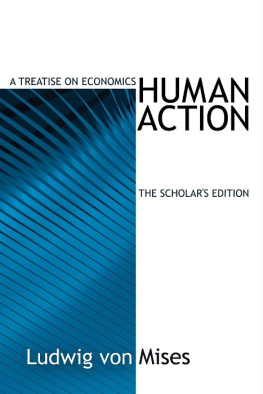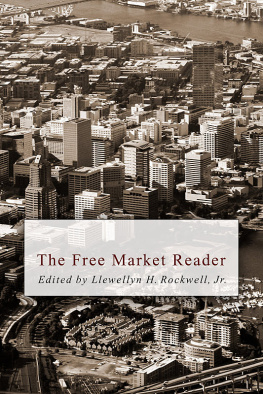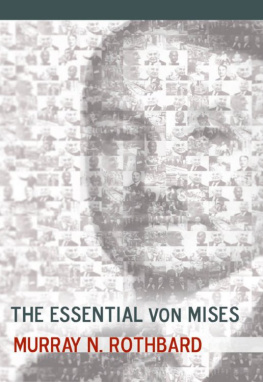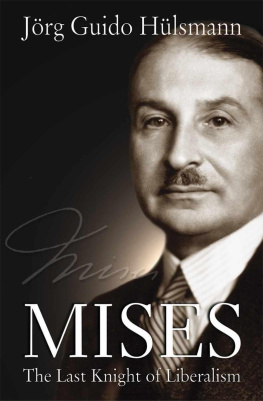Liberty
& Property
Liberty
& Property
by
Ludwig von Mises
LvMI
MISES INSTITUTE
2009 by the Ludwig von Mises Institute and published under the Creative Commons Attribution License 3.0.
http://creativecommons.org/licenses/by/3.0/
Ludwig von Mises Institute
518 West Magnolia Avenue
Auburn, Alabama 36832
www.mises.org
ISBN: 978-1-933550-54-1
...the policies of individualism and of capitalism, its application to economic matters, do not need any apologists or propagandists. The achievements speak for themselves .
Ludwig von Mises
CONTENTS
At the end of the eighteenth century there prevailed two notions of liberty, each of them very different from what we have in mind today referring to liberty and freedom.
The pre-capitalistic system of product was restrictive. Its historical basis was military conquest.
What vitiates entirely the socialists economic critique of capitalism is their failure to grasp the sovereignty of the consumers in the market economy.
It was different in the esoteric discussions among the inner circles of the great conspiracy. There the initiated did not dissemble their intentions concerning liberty.
Romantic philosophy labored under the illusion that in the early ages of history the individual was free and that the course of historical evolution deprived him of his primordial liberty.
However, one does not exhaustively describe the sweeping changes that capitalism brought about in the conditions of the common man if one merely deals with the supremacy he enjoys on the market as a consumer.
The distinctive principle of Western social philosophy is individualism. It aims at the creation of a sphere in which the individual is free to think, to choose, and to act without being restrained by the interference of the social apparatus of coercion and oppression, the State.
Liberty
& Property
I
A T THE END of the eighteenth century there prevailed two notions of liberty, each of them very different from what we have in mind today referring to liberty and freedom.
The first of these conceptions was purely academic and without any application to the conduct of political affairs. It was an idea derived from the books of the ancient authors, the study of which was then the sum and substance of higher education. In the eyes of these Greek and Roman writers, freedom was not something that had to be granted to all men. It was a privilege of the minority, to be withheld from the majority. What the Greeks called democracy was, in the light of present-day terminology, not what Lincoln called government by the people, but oligarchy, the sovereignty of fullright citizens in a community in which the masses were meteques or slaves. Even this rather limited freedom after the fourth century before Christ was not dealt with by the philosophers, historians, and orators as a practical constitutional institution. As they saw it, it was a feature of the past irretrievably lost. They bemoaned the passing of this golden age, but they did not know any method of returning to it.
The second notion of liberty was no less oligarchic, although it was not inspired by any literary reminiscences. It was the ambition of the landed aristocracy, and sometimes also of urban patricians, to preserve their privileges against the rising power of royal absolutism. In most parts of continental Europe, the princes remained victorious in these conflicts. Only in england and in the Netherlands did the gentry and the urban patricians succeed in defeating the dynasties. But what they won was not freedom for all, but only freedom for an elite, for a minority of the people.
We must not condemn as hypocrites the men who in those ages praised liberty, while they preserved the legal disabilities of the many, even serfdom and slavery. They were faced with a problem which they did not know how to solve satisfactorily. The traditional system of production was too narrow for a continually rising population. The number of people for whom there was, in a full sense of the term, no room left by the pre-capitalistic methods of agriculture and artisanship was increasing. These supernumeraries were starving paupers. They were a menace to the preservation of the existing order of society and, for a long time, nobody could think of another order, a state of affairs, that would feed all of these poor wretches. there could not be any question of granting them full civil rights, still less of giving them a share of the conduct of affairs of state. the only expedient the rulers knew was to keep them quiet by resorting to force.
This article was originally delivered as a lecture at Princeton University, October 1958, at the 9th Meeting of the Mont Pelerin Society.
II
T HE PRE-CAPITALISTIC system of product was restrictive. Its historical basis was military conquest. The victorious kings had given the land to their paladins. These aristocrats were lords in the literal meaning of the word, as they did not depend on the patronage of consumers buying or abstaining from buying on a market. On the other hand, they themselves were the main customers of the processing industries which, under the guild system, were organized on a corporative scheme. This scheme was opposed to innovation. It forbade deviation from the traditional methods of production. The number of people for whom there were jobs even in agriculture or in the arts and crafts was limited. Under these conditions, many a man, to use the words of Malthus, had to discover that at natures mighty feast there is no vacant cover for him and that she tells him to be gone. But some of these outcasts nevertheless managed to survive, begot children, and made the number of destitute grow hopelessly more and more.
But then came capitalism. It is customary to see the radical innovations that capitalism brought about in the substitution of the mechanical factory for the more primitive and less efficient methods of the artisans shops. This is a rather superficial view. The characteristic feature of capitalism that distinguishes it from pre-capitalist methods of production was its new principle of marketing. Capitalism is not simply mass production, but mass production to satisfy the needs of the masses. The arts and crafts of the good old days had catered almost exclusively to the wants of the well-to-do. But the factories produced cheap goods for the many. All the early factories turned out was designed to serve the masses, the same strata that worked in the factories. They served them either by supplying them directly or indirectly by exporting and thus providing for them foreign food and raw materials. This principle of marketing was the signature of early capitalism as it is of present-day capitalism. The employees themselves are the customers consuming the much greater part of all goods produced. They are the sovereign customers who are always right. Their buying or abstention from buying determines what has to be produced, in what quantity, and of what quality. In buying what suits them best they make some enterprises profit and expand and make other enterprises lose money and shrink. Thereby they are continually shifting control of the factors of production into the hands of those businessmen who are most successful in filling their wants. Under capitalism private property of the factors of production is a social function. The entrepreneurs, capitalists, and land owners are mandataries, as it were, of the consumers, and their mandate is revocable. In order to be rich, it is not sufficient to have once saved and accumulated capital. It is necessary to invest it again and again in those lines in which it best fills the wants of the consumers. The market process is a daily repeated plebiscite, and it ejects inevitably from the ranks of profitable people those who do not employ their property according to the orders given by the public. But business, the target of fanatical hatred on the part of all contemporary governments and self-styled intellectuals, acquires and preserves bigness only because it works for the masses. The plants that cater to the luxuries of the few never attain big size. The shortcoming of nineteenth-century historians and politicians was that they failed to realize that the workers were the main consumers of the products of industry. In their view, the wage earner was a man toiling for the sole benefit of a parasitic leisure class. They labored under the delusion that the factories had impaired the lot of the manual workers. If they had paid any attention to statistics they would easily have discovered the fallaciousness of their opinion. Infant mortality dropped, the average length of life was prolonged, the population multiplied, and the average common man enjoyed amenities of which even the well-todo of earlier ages did not dream.

